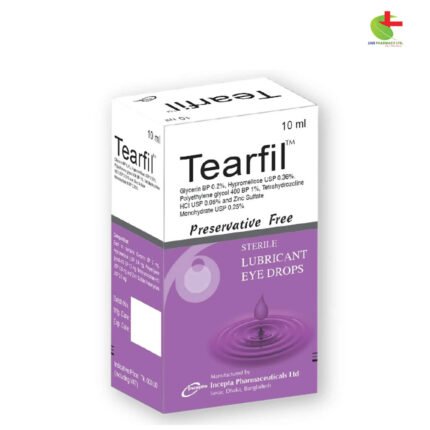Lupred
180.00৳ Bottle (5ml)
- Lupred is used to treat inflammation and pain related to ocular surgeries, uveitis, and conditions like blepharitis and corneal inflammation.
- It contains Difluprednate, a corticosteroid that reduces inflammation by inhibiting key inflammatory agents.
- Suitable for both pediatric and geriatric patients, Lupred is safe when used as prescribed by healthcare professionals.
- Long-term use may require monitoring for increased intraocular pressure and cataract formation.
 Brand
Brand
|
Incepta Pharmaceuticals Ltd |
|---|---|
 Generics
Generics
|
Difluprednate |
 Type
Type
|
Ophthalmic Emulsion |
Indications
Lupred is prescribed for managing inflammation and pain related to ocular surgery. It is also effective for treating uveitis, pseudophakic cystoid macular edema (CME), and ocular surface conditions like blepharitis and corneal inflammation.
Always follow the advice of a registered healthcare professional.
Pharmacology
Corticosteroids reduce the body’s inflammatory response to various triggers and may slow down the healing process. They work by limiting edema, fibrin buildup, capillary dilation, leukocyte and fibroblast proliferation, collagen deposition, and scar formation. Although the exact mechanism of action for ocular corticosteroids is not fully understood, it is believed that they act by inducing phospholipase A2 inhibitory proteins, called lipocortins. These proteins help regulate the production of potent inflammatory agents like prostaglandins and leukotrienes by inhibiting arachidonic acid release, which is a precursor to these mediators. Difluprednate shares structural similarities with other corticosteroids.
Dosage & Administration
- Post-Ocular Surgery Inflammation and Pain: Administer 1 drop into the conjunctival sac of the affected eye 4 times daily, starting 24 hours after surgery. Continue for 2 weeks, followed by 2 drops per day for a week, with tapering based on the response.
- Endogenous Anterior Uveitis: Apply 1 drop to the affected eye 4 times daily for 14 days, followed by a gradual tapering as advised by a healthcare provider.
- Blepharitis: Instill 1 drop twice daily for a week, then reduce to once daily for the following week.
- Pseudophakic Cystoid Macular Edema (CME): Use 1 drop in the affected eye twice daily.
Always follow the advice of a registered healthcare professional.
Drug Interactions
No specific drug interaction studies have been conducted with Lupred 0.05% ophthalmic emulsion.
Contraindications
Lupred (Difluprednate) should not be used in patients with active viral infections of the cornea or conjunctiva, such as epithelial herpes simplex keratitis, vaccinia, or varicella. It is also contraindicated in cases of mycobacterial and fungal infections of the eye.
Side Effects
Possible side effects from ophthalmic steroids include increased intraocular pressure, which may lead to optic nerve damage, visual field defects, and posterior subcapsular cataracts. Other risks include secondary ocular infections, particularly herpes simplex, and perforation of the globe in cases of corneal or scleral thinning. Lupred users may also experience corneal edema, eye pain, photophobia, conjunctival redness, blepharitis, and other reactions related to eye surgery.
Pregnancy & Lactation
- Pregnancy: Classified as Category C. Difluprednate has shown to be embryotoxic and teratogenic in animal studies. Since its safety during pregnancy in humans hasn’t been established, it should only be used if the benefits outweigh the risks to the fetus.
- Lactation: It is not known if Difluprednate passes into breast milk. Use with caution when administered to nursing mothers.
Precautions & Warnings
- Long-term corticosteroid use may cause glaucoma and posterior subcapsular cataracts. In cases where Lupred is used for more than 10 days, intraocular pressure (IOP) should be monitored.
- Patients with a history of herpes simplex should use corticosteroids cautiously.
- Fungal infections of the cornea may develop with prolonged use of local steroids.
- Avoid touching the dropper tip to any surface to prevent contamination.
Use in Special Populations
- Pediatric Use: Lupred has been tested in children aged 0-3 years following cataract surgery. Safety profiles were similar to Prednisolone Acetate ophthalmic suspension 1%.
- Geriatric Use: No significant differences in safety or efficacy have been noted between elderly and younger patients.
Overdose Effects
An overdose is unlikely to cause acute problems. In case of accidental ingestion, drinking fluids may help dilute the effects.
Therapeutic Class
Ophthalmic steroid preparations.
Storage Conditions
Store at room temperature, protected from light and freezing. Do not use the contents for more than a month after first opening the bottle.













Reviews
There are no reviews yet.